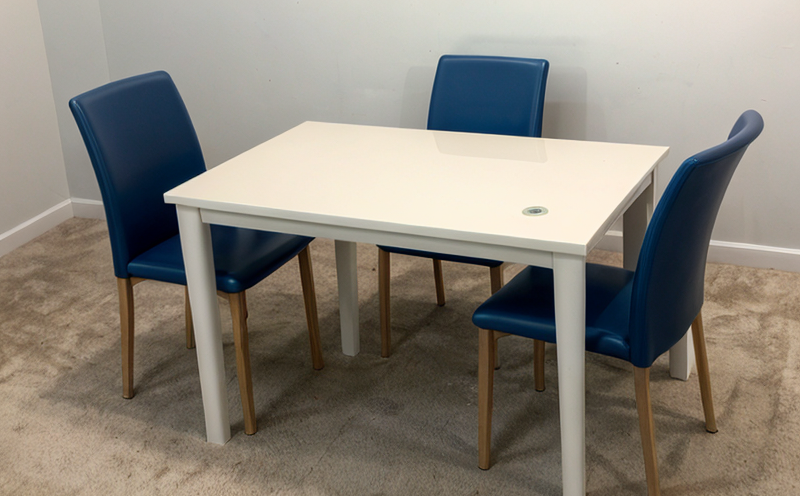ASTM E1530 Thermal Performance Testing of Interior Plastics
The ASTM E1530 standard is a critical procedure used to evaluate the thermal performance characteristics of interior plastics. This test assesses how well the material resists heat and prevents the transfer of heat, which is crucial for ensuring safety in residential and commercial environments. Understanding the thermal behavior of plastics is essential because it directly impacts fire safety, comfort, and durability.
In furniture and interior applications, where plastics are often exposed to direct sunlight or high ambient temperatures, the ability to withstand elevated temperatures without degrading can significantly enhance product longevity and occupant safety. For instance, in automotive interiors, the material must not only be aesthetically pleasing but also thermally stable under a wide range of conditions.
The testing procedure involves subjecting samples cut from the interior plastic components to controlled thermal environments. The test measures parameters such as heat deflection temperature (HDT), which indicates the point at which a sample begins to deform under applied load, and heat resistance index (HRI), which gauges how well the material resists heat.
Thermal performance testing is particularly important for plastics used in seating, upholstery, and trim. These materials must meet stringent fire safety standards such as UL 94 and can be further evaluated using ASTM E1530 to ensure they perform reliably under real-world conditions. This service provides critical data that helps manufacturers design safer, more comfortable interiors.
The testing process is highly standardized to ensure consistency across different labs and regions. It involves precise control over environmental factors such as temperature, humidity, and load application. The results provide valuable insights into the thermal stability of the material, which can inform product development decisions and help meet regulatory requirements.
| Applied Standards |
|---|
| ASTM E1530: Standard Practice for Determining Thermal Performance of Interior Plastics |
The ASTM E1530 standard is widely recognized and adopted in the industry. It provides a comprehensive framework for testing interior plastics, making it an essential tool for manufacturers, designers, and safety experts.
Why It Matters
The thermal performance of interior plastics plays a pivotal role in ensuring occupant safety and comfort. In environments where materials come into direct contact with occupants, such as automotive interiors or home furniture, the ability to withstand heat without degrading is crucial.
- Safety: Materials that fail under heat can lead to fire hazards, which are particularly dangerous in enclosed spaces like vehicles and homes.
- Durability: Understanding thermal performance helps manufacturers choose materials that will last longer, reducing maintenance costs and improving overall product quality.
- Comfort: Materials that retain heat poorly provide a more comfortable experience for occupants by maintaining a consistent temperature in the interior space.
The ASTM E1530 test ensures that these critical aspects are addressed, providing manufacturers with reliable data to make informed decisions. This testing is not just about compliance; it's about creating safer and more durable products.
Applied Standards
| Standard | Description |
|---|---|
| ASTM E1530 | Standard Practice for Determining Thermal Performance of Interior Plastics |
The ASTM E1530 standard is the cornerstone of thermal performance testing in interior plastics. It provides a detailed and comprehensive approach to evaluating how well materials withstand heat, ensuring that products meet safety and comfort standards.
Why Choose This Test
- Comprehensive Evaluation: The test evaluates multiple aspects of thermal performance, providing a holistic view of the material's capabilities.
- Regulatory Compliance: Ensures that products meet safety standards such as UL 94 and other relevant regulations.
- Data-Driven Decisions: Provides manufacturers with critical data to inform product design and development decisions.
- Rigorous Testing: Uses controlled environments and precise instrumentation to ensure accurate results.
The ASTM E1530 test is a reliable choice for those looking to ensure the highest quality in interior plastics, contributing to safer and more comfortable products.





